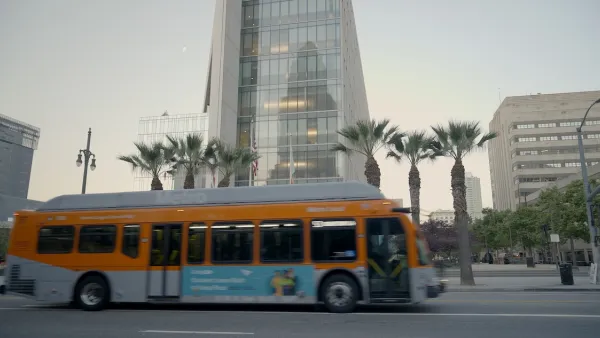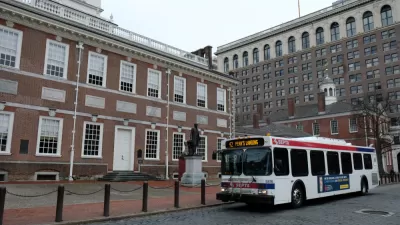A pilot program tested AI-powered cameras that monitored bus-only lanes for parked vehicles.

Windshield-mounted cameras on board buses operated by the Southeastern Pennsylvania Transportation Authority (SEPTA) caught vehicles blocking bus-only lanes 36,392 times in a 70-day period, reports Thomas Fitzgerald in The Philadelphia Inquirer.
The pilot automated enforcement program did not result in any tickets or warnings issued to drivers, but “The test documented the need for and feasibility of a permanent camera enforcement program, agency officials said.
In addition to facilitating faster and more reliable bus service, dedicated bus lanes improve passenger safety and accessibility. “Blockages of bus stops endanger passengers who have to step into traffic to board or disembark, SEPTA says; it is a particular problem for wheelchair users and other people with mobility issues.”
The article notes that the program exempted emergency responders and moving vehicles making legal right turns in designated areas. While supporters of automated enforcement say cameras make enforcement more equitable and prevent unnecessary confrontations with law enforcement, the technology has been criticized for failing to accurately identify vehicles and situations.
SEPTA is asking the city to permit a widespread automated enforcement program. “The agency believes that only a city ordinance would be required to authorize camera enforcement of parking violations. Using automated enforcement for moving violations in bus zones would require state legislation.”
FULL STORY: SEPTA cameras documented more than 36,000 vehicles blocking bus lanes and stops

Planetizen Federal Action Tracker
A weekly monitor of how Trump’s orders and actions are impacting planners and planning in America.

Congressman Proposes Bill to Rename DC Metro “Trump Train”
The Make Autorail Great Again Act would withhold federal funding to the system until the Washington Metropolitan Area Transit Authority (WMATA), rebrands as the Washington Metropolitan Authority for Greater Access (WMAGA).

The Simple Legislative Tool Transforming Vacant Downtowns
In California, Michigan and Georgia, an easy win is bringing dollars — and delight — back to city centers.

The States Losing Rural Delivery Rooms at an Alarming Pace
In some states, as few as 9% of rural hospitals still deliver babies. As a result, rising pre-term births, no adequate pre-term care and "harrowing" close calls are a growing reality.

The Small South Asian Republic Going all in on EVs
Thanks to one simple policy change less than five years ago, 65% of new cars in this Himalayan country are now electric.

DC Backpedals on Bike Lane Protection, Swaps Barriers for Paint
Citing aesthetic concerns, the city is removing the concrete barriers and flexposts that once separated Arizona Avenue cyclists from motor vehicles.
Urban Design for Planners 1: Software Tools
This six-course series explores essential urban design concepts using open source software and equips planners with the tools they need to participate fully in the urban design process.
Planning for Universal Design
Learn the tools for implementing Universal Design in planning regulations.
Smith Gee Studio
City of Charlotte
City of Camden Redevelopment Agency
City of Astoria
Transportation Research & Education Center (TREC) at Portland State University
US High Speed Rail Association
City of Camden Redevelopment Agency
Municipality of Princeton (NJ)





























